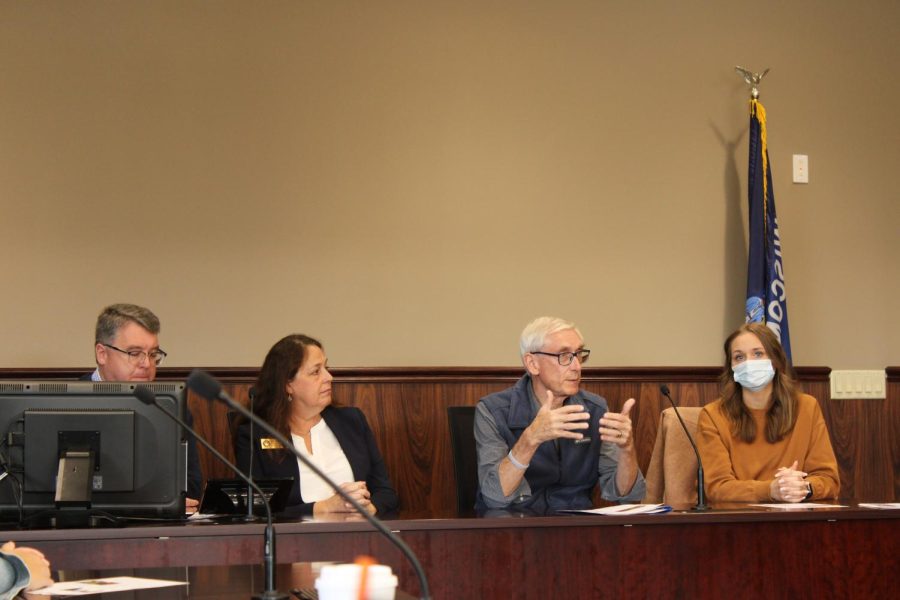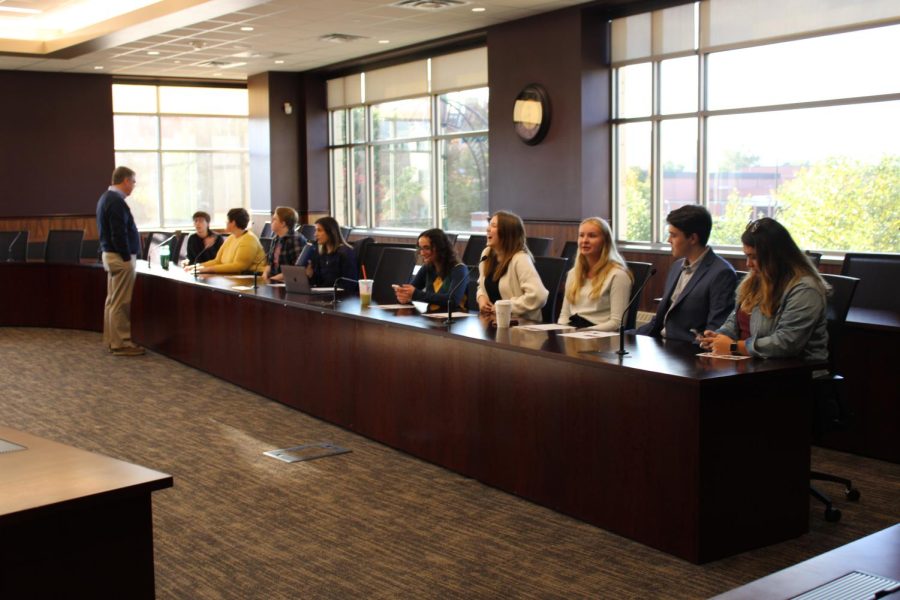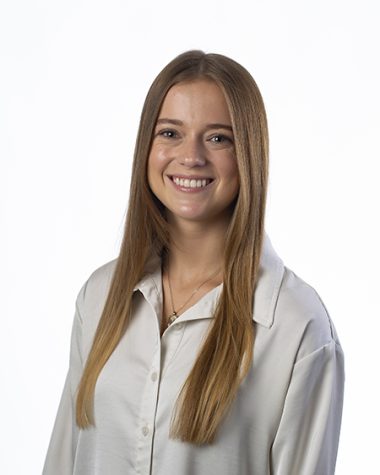Wisconsin Governor Tony Evers visits UWL students
September 29, 2022
Early this morning, starting at 8:30 a.m., the University of Wisconsin-La Crosse students gathered in the senate chambers to have an open discussion with politicians in Wisconsin, including Governor Tony Evers. Joined with him, Wisconsin Senator Brad Pfaff and the 95th Assembly District Representative Jill Billings also sat down to speak with students.
Defending reproductive rights, higher education affordability and accessibility, combatting the climate crisis, commonsense gun violence reforms, and marijuana legalization were the topics listed as the top concerns of college students on a handout provided by Governor Evers.
UWL third-year Jenasea Hameister introduced Governor Tony Evers, “I want to start by thanking all of you for coming this morning and Governor Evers for coming to UWL.”
“I’m going across the state to different campuses talking about what students think is important going forward,” said Governor Evers, “Reproductive rights is a huge issue across this country, and the women in the room were made second-class citizens overnight. My position is that we should go back to the way it was under Roe v. Wade. This is something that has divided the state, but my personal belief is that it worked for years under Roe v. Wade and frankly we are now faced with the possibility of the 1849 law being the law of the land, which is something that I find unacceptable.”
Another issue college students ask about is the legalization of marijuana. “That’s something I support, all the neighboring states around us have legalized some form of marijuana, whether it’s medicinal or recreational,” said Governor Evers.
Governor Evers then opened the floor up to questions.
UWL fifth-year Ryan Sperling asked, “In the new budget that you are formulating, what are you doing to increase the ability to walk, bike, and use public transportation in cities? Are funds for those purposes increasing in this budget?”
Governor Evers said, “We are going to have money for transit. We also assist local governments in getting public transportation, such as busses, and because of President Joe Biden and Congress’s help in proposals around infrastructure, there will be a significant amount of money for those projects.”
Senator Pfaff said, “Without a doubt, it’s important that we have our neighborhoods walkable as well. Continuing to work with developers and neighborhood associations to make sure we have sidewalks, and again, that is something where you have the cooperation between the state and local governments working with private developers as well.”
Another UWL student said, “Do you have any ideas on how we can work on encouraging more students to get out and vote?”
“There’s a possibility that politicians and people in government will make it more difficult to vote. I have vetoed 128 bills in my three and a half years as Governor, many of which would have made it more difficult to vote. It comes from this idea that this last Presidential election was a fraud. This puts an idea in people’s minds that voting isn’t safe,” said Governor Evers.
“Several of these bills would’ve made it more difficult for people with disabilities or people residing in nursing homes to be able to vote. I am concerned with this, we should be making every effort to make it easier for people to vote. It’s one of the most important parts of our democracy,” said Governor Evers, “We count on our university campuses, in a nonpartisan way, to get people fired up about voting. I encourage you to one-on-one talk to your neighbors, talk to your friends, voting is important.”
UWL fourth-year Jared Zwettler said, “To what extent would you work to try to expunge the criminal records of those previously convicted of marijuana, possession, or consumption?”
“It would be illogical not to attempt to do that. If it’s legal now, but there are thousands of people here that have been convicted of some sort of marijuana charge, some sort of expungement should be looked into,” said Governor Evers.
Another UWL student said, “Do you have any legislation planned on protecting transgender and LGBTQ+ people in the face of all the anti-gay and anti-trans laws?”
“I support the LGBTQ+ community, but if we need a law to protect that right, I’m for it. I vetoed legislation that would have made it more difficult for transgender kids to survive in public schools, and I’ll veto those again,” said Governor Evers, “Universities and schools should be supportive and welcoming of all kids.”
UWL fourth-year Morgan Hose said, “What piece of advice do you have for college students, the future of America, that have to see gun violence, reproductive rights being taken away, climate crisis, and so much more being displayed on the media, which further divides our country politically? What do you advise us to do going forward on these issues?”
“One of our first goals should be to try to have some unity as Americans and as Wisconsinites to show that we can work together and get things accomplished. Until such time that can actually happen, we have to be strong on these issues,” said Governor Evers, “I think there is room to find common ground on some issues, such as legalizing marijuana and climate change, but some of these I don’t think there is much common ground, such as reproductive rights and voting rights.”
Senator Pfaff said, “The Governor is correct, there is an extremely partisan legislature right now in Madison. Representative Billings and I are doing our best there. When the legislature decides to adjourn in early March, but all these topics still need to be addressed, and they decided to go home and play partisan politics, rather than doing the people’s business, that’s disappointing. I encourage you to stay positive, that doesn’t mean you give up, you have to get engaged. This election is really important because there is a lot on the line here in Madison, Washington D.C., and the future direction of where we go and how we move forward.”
Representative Jill Billings said, “This is a difficult time. I really work hard to find common ground, but if we can’t, then I stand my ground.”
As a final statement, UWL Chancellor Joe Gow said, “All three of these legislators have reached out to me at various times and deeply care about what we do here at the University. I urge you to vote, read the candidate’s records on education, and there’s one candidate in one of the races who doesn’t want to come to our campus and that is very troubling. We need to be able to keep having these conversations and elect legislators who respect that and understand the importance of that. That’s why we’re here.”
On Tuesday, Nov. 8, there will be a nationwide election held to elect all 435 seats in the House of Representatives and 35 of the 100 seats in the Senate will be contested. 39 state and territorial gubernatorial elections, as well as numerous other state and local elections, will be contested. For more information on how to vote, visit here.
For more information on Governor Tony Evers, Senator Brad Pfaff, and Representative Jill Billings:








